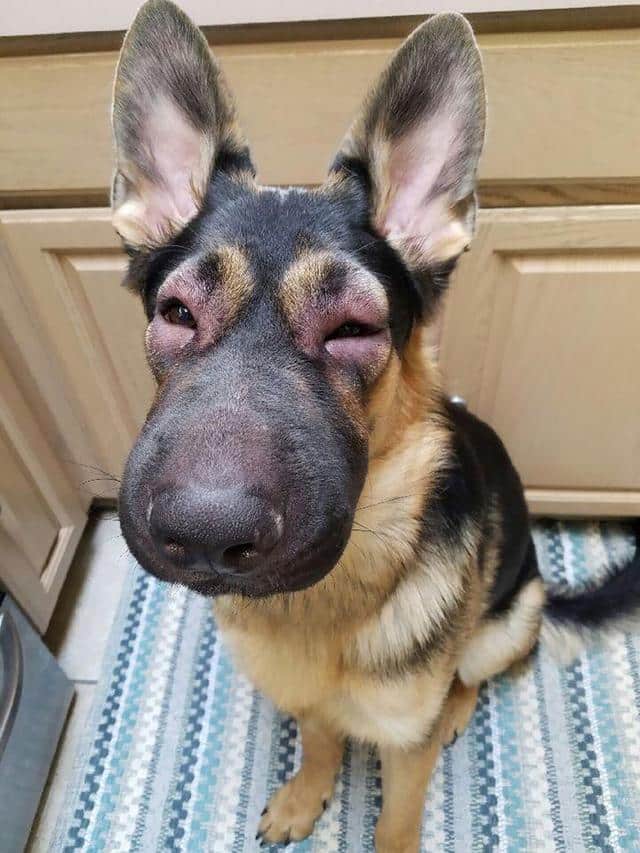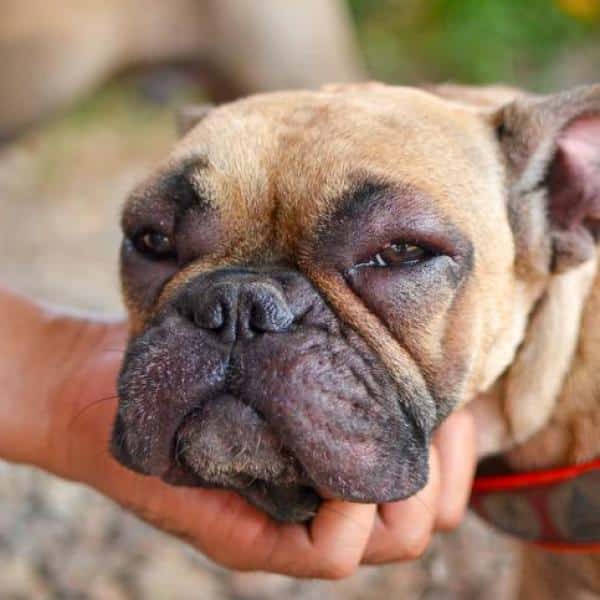Seeing your dog’s face all swollen can be so alarming. Nobody wants to see their dog having any kind of health issues.
So, what should you do in this emergency?
Is it always serious, or can it be a non-life-threatening issue? This article will discuss all of these things and the potential causes of a swollen face in dogs.
Continue reading to find out everything about swollen faces in dogs!
Swollen Face – Causes

In reality, there is no one cause of a swollen face in dogs. Truth be told, there are various reasons why your dog’s face is all puffy today. Usually, the swelling is caused by exposure to an external element.
A negative reaction to an external element is called an allergic reaction. However, that doesn’t mean that plenty of other things cannot cause a swollen face, so let’s get into all the reasons behind swelling in the face!
Allergic Reactions
We have already mentioned the allergic reaction because it’s an allergy that commonly causes swelling. There are many different things that your dog could get an allergic reaction to, like the vaccine, certain medications, foods, bug bites – especially bee stings, exposure to toxins, pollen, and other potential environmental allergens. Bee sting allergy is specific because mild cases can cause dog lip swollen on one side, with more severe cases being dog lips swollen and dog nose swollen.
Allergic reactions happen in such a way that they cause an inflammatory response in your dog’s body. When your dog is allergic to something, he can get hives all over his body, as well as some swelling – most commonly around the face and neck, along with other symptoms.
Dog facial swelling can extend to the muzzle and the eyelids, as well. If the neck starts swelling, this is where this allergic reaction can become serious. The neck swelling can be very dangerous because it can affect breathing.
Dog swollen face can be a sign that your pupper needs a mild medical intervention. However, if the swelling starts to affect breathing because the dog’s snout is swollen, your pup will need serious intervention because that is a major allergic reaction and is considered an emergency situation.
Dental Issues
Almost every human being on the planet has experienced facial swelling when dealing with dental issues. It’s the same with dogs – problems with the teeth, gums, or mouth can cause swelling.
Things like tooth abscesses and dental problems can cause a swollen face. The infection can go deep under the gums and create a small pocket filled with pus, which makes the face appear swollen.
That pocket also causes the face to be tender, so be careful if you touch that area – you can hurt your pup. The swelling can go beneath the eye and affect the sight on that side – but there are other causes. Injuries in the mouth, a broken tooth, as well as periodontal disease can also cause some swelling to the face.
Trauma
Beyond dental issues, traumatic injuries are another common cause of your dog’s facial swelling. Traumatic injuries can result from various incidents, such as falls or bites from other animals. These injuries often lead to swelling in your dog’s face or head, causing pain and discomfort.
When trauma occurs, the first step you should take is to assess your dog’s condition. Look for any visible signs of injury and monitor their behavior for any changes.
Next, seek immediate veterinary attention. It’s essential to have a professional evaluate the severity of the trauma and the resultant swelling.
While your vet will provide the appropriate treatment, be prepared to administer any prescribed medications. Follow your vet’s instructions to ensure your dog’s recovery.
Lastly, prevention is key. Keep your dogs away from potentially dangerous situations to avoid traumatic injuries and swelling.
Tumors
Another cause you should be aware of when your dog’s face swells is tumors, which can put pressure on the facial region, leading to noticeable swelling. Tumors causing facial swelling can either be benign or malignant. Both types can cause discomfort and may pose significant health problems, particularly if they’re growing at a rapid pace.
Benign causes, while not cancerous, can still create pressure that triggers swelling and pain. Malignant tumors, on the other hand, are more serious as they’re cancerous and can lead to further complications. If you notice a persistent swelling that doesn’t improve or worsens over time, it’s crucial to have your dog checked by a vet.
A vet can diagnose the presence of tumors through various tests. They’ll also determine whether the tumor is benign or malignant. Depending on the findings, your vet may recommend surgery or other treatments.
How To Treat Facial Swelling In Dogs?

Following a diagnosis of facial swelling in your dog, there are several treatment options you can explore with your vet, depending on the identified cause. These options range from medicinal treatments to surgical procedures, all aimed at reducing the swelling and ensuring your dog’s health and comfort.
Of course, treatment depends on the severity of the symptoms. If your pup seems like he is not doing too great, you should find the nearest location of a veterinarian to get a diagnosis. A swollen nose or mouth may be preventing your poor pup from breathing properly, and the vet should rule out other causes.
The treatment is usually simple for all animals, but the veterinarian needs to perform thorough checks beforehand.
Treatment For Allergic Reaction
Your vet may prescribe antihistamines or steroids to reduce the swelling. In some cases, an antibiotic ointment might be applied and a special diet recommended to avoid future reactions.
The choice of drugs administered depends on the severity of the symptoms. Some food allergies can cause very bad signs and symptoms.
Moderate and mild reactions usually don’t have to be seen by a veterinarian – these can be treated at home. All you need to do is get some antihistamines and administer them to your poor pooch. If you aren’t sure about the dosage for pets, contact the vet just to be on the safe side. The veterinarian on the phone may suggest some anti-inflammatories as well, as a part of the allergy treatment plan.
To rule out extreme reactions, check if your dog is breathing as usual and if there isn’t any lethargic behavior. On the other hand, if the cause of the swollen face is unknown, you should visit the vet to find out the diagnosis.
Treatment For Dental Problems
The treatment could involve surgical drainage, antibiotics, and anti-inflammatory pain medication. If a tooth is infected, it might need to be removed.
Oral and dental issues and infections mean that your dog may require work from dental veterinary professionals. The pros will usually start the treatment with antibiotics and anti-inflammatory medications to treat the underlying cause.
Afterward, the doctor will likely decide on anesthesia for a dental cleaning and a thorough exam. While under anesthesia, the vet may also decide to do dental x-rays.
The vet will provide medical advice, but they may also decide to perform oral surgery to treat other symptoms or issues. The dog will likely get sent home with another round of antibiotics.
Treating Trauma
If the dog has experienced trauma to the head or facial area, the treatment will depend on the severity of the trauma. The vet will require to do an x-ray to determine how bad the trauma is, after providing the dog with the first aid. When getting the treatment, the dog may get antibiotics, anti-inflammatories, and some care alongside everything.
Treating Tumors
Depending on the nature of the tumor, your vet might suggest surgery, radiotherapy, or a combination of both.
If the veterinarian is worried that the uncontrolled growth is, in fact, a tumor or cancer – more testing will be needed. The vet will recommend doing x-rays and testing the tumor via biopsy or blood tests.
The treatment itself depends on the severity and the diagnosis itself. If the tumor is malignant, the plan will require radiation, chemotherapy, and even surgery.
Bacterial Infections: The treatment may involve soaking the wound, painkillers, and antibiotics.
How To Prevent Facial Swelling?

When the dog’s face is swollen, the best way to deal with it the next time is to avoid it completely. The vets that do provide medical advice always say that prevention is the best remedy.
If your dog experiences allergies, you should do your best to minimize the exposure to the allergen. Talk to the vet about them prescribing antihistamines you can give to your dogs to prevent the attack.
If the allergens are present in food, your pet eating a special diet will certainly help a lot. If the dog is allergic to vaccines, always let the veterinarian know before they start giving the shots.
On the other hand, if the issue at hand is an allergy to a bee sting, or animal bites (skin allergies), try to treat your pooch with antihistamines as soon as you see that the issue happened. Talk to the vet about this before you start giving the antihistamines for the allergies on your own. If the dog’s skin is still rashy after a day, see the vet immediately – the meds may not be enough.
If the presumptive diagnosis is that your dog doesn’t have allergies but dental problems – they are easily prevented. All you need to do is take good care of your pup’s teeth, and that’s it – much simpler than preventing allergies.
Trauma cannot be prevented at all – but you can try to aim to keep your pup safe. So, you shouldn’t let your pup run free, and limit playing with other dogs. If any trauma does occur, you should visit the vet to check out the signs and issues.
The same thing is with tumors – they simply cannot be prevented. The key is to act early if you do notice any signs of growth on the jaw – detecting a rare condition as soon as possible is principal for treatment, especially for Great Danes.
Dog Face Swollen – Bottom Line

Facial swelling doesn’t have to be serious, and an allergic reaction usually causes it. Try to look for other signs – like runny eyes or hives. Allergic reactions are easily treatable, and some are even preventable – like food and most skin allergies.
Preventing an insect bite is not possible, but taking good care of your pet is the key to keeping him safe! Treating all the signs as they occur means your pet won’t experience anything truly dangerous!


